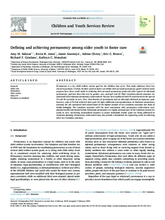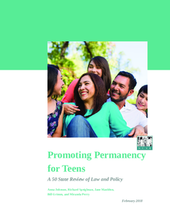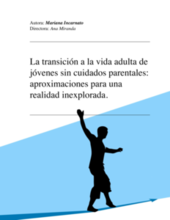Displaying 651 - 660 of 991
This study addresses three key research questions: (1) How do older youth in foster care define their personal permanency goals? (2) How much progress have these youth made in achieving their personal permanency goals and other aspects of relational permanency, and how does this vary by gender, race, and age? and (3) What transition-related outcomes are associated with relational permanency achievement?
This in depth qualitative study of 10 youth who completed the My Life intervention focused on investigating coaching and mentoring elements and processes that youth participants identify as most important to their success, with the intention of informing the further development of youth-directed approaches to supporting young people who are transitioning to adulthood.
This paper explores the diversity of U.S. state policies and practices for teens in foster care in two potentially competing areas: teens’ need for a permanent connection to a family (either their birth family, or an adoptive or guardian family), and teens’ developmental and practical needs in transitioning to legal adulthood, independence, and self-sufficiency.
El trabajo se centra en el análisis de las trayectorias de un grupo de 199 adolescentes y jóvenes que viven o han vivido institucionalizados por una medida excepcional de cuidado, en siete provincias argentinas.
The goals of the present study are to examine the association between childhood adversity and adult functioning among youth aging out-of-care, and to explore how attributes of their social support networks mediate this association.
This paper discusses findings from a small-scale qualitative study conducted in Harare, Zimbabwe. Findings show that young people aging out from Harare’s care institutions face challenges making their transition from care into adulthood.
This article reports on a systematic review of research on residential care-leaving in South Africa, from 2003 to 2016.
This paper discusses some of the challenges facing care leavers and the development of the care-leaving debate, legislation and policy in the United Kingdom, United States and Australia. A comparison of the care-leaving arena in South Africa and the support services available to care leavers in the different countries will be presented.
The current study tests the ‘overburdening’ hypothesis that examines whether taking on the demands of work and school at the same time could overwhelm and actually hinder the healthy development of youth as they transition from foster care.
This sudy sought to deepen understanding of the underlying patterns of services receipt of the John F. Chafee Foster Care Independence Program (CFCIP) to prepare for youth’s successful transition to adulthood. The authors used multi-level latent class analysis (MLCA) to identify underlying combinations of service receipt that may be influenced by youth-level and state-level characteristics.



